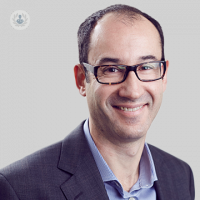Resolving the pain: Why hip replacement is one of the most successful surgeries
Written in association with:Hip replacement surgery is said to be a safe and effective process, and this can offer reassurance to patients are due to undergo this process. However, just how safe and effective?
Leading Farnham & Guildford orthopaedic surgeon Mr Seb Sturridge answers these questions, and more, in this comprehensive article.

Why might someone need a hip replacement?
If your hip is causing pain that is interfering with your ability to exercise or sleep, and affecting work or your ability to look after you children, it may be time to consider having your hip replaced.
What does hip replacement surgery entail?
A minimally invasive total hip replacement usually entails a two-day admission into hospital, but you may be fit to return home the day after surgery, and some hips are now replaced as day cases.
The procedure requires a regional anaesthetic, and then surgery to remove the worn-out painful hip joint, replacing it with a new component typically with ceramic and polyethylene bearing surfaces. Patients can walk as soon as their anaesthetic has worn off.
What’s the success rate of hip replacement surgery?
Hip replacement is considered one of the three most successful surgeries of the 21st century, with cataract surgery and coronary bypass surgery. Most patients are walking the same day as surgery, and the vast majority have forgotten they have had their hip replaced twelve months after surgery.
You can expect to return to any form of low impact exercise regime, and self-employed patients can be back at work within a week. Patients can make a return to higher level of exercise such as running, but this is likely to have an impact on implant longevity.
How often is revision hip surgery required? Are the results of hip replacement surgery permanent?
As a trainee I was taught to be conservative about who should be considered for joint replacement surgery; surgeons were concerned there was a significant risk that surgery would need to repeated 10 to 15 years later. But now most patients can expect their implants to outlast them.
Younger or more active patients run a higher risk of their implant failing and needing revision in their lifetime, but modern implants and bearings have failure rates of less than 5 per cent over the same time period, and revision surgery is becoming safer and less invasive.
Will all of my symptoms go away?
Hip replacement resolves all the pain of arthritis or a damaged native hip joint, but the muscles and tendons will be deconditioned and so it can take several weeks or months to rehabilitate and fully recover after surgery.
If you’re looking for an expert orthopaedic hip and knee surgeon in Farnham or Guildford, Mr Sturridge can help. Arrange an appointment with him via his Top Doctors profile today.


